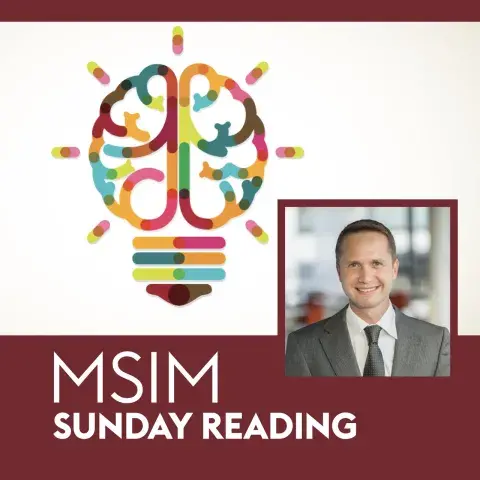
MSIM Sunday Reading is a weekly publication highlighting a current and relevant topic chosen by a professor of the Master of Science in International Management for their courses. The Franklin community gets an inside look at the coursework and specializations offered at MSIM and expert commentary on international issues affecting our world today. This week's MSIM Sunday Reading is in conversation with Michael Lewrick, Visiting Professor in Applied Design Thinking and Innovation Management at Franklin. His article explores the next paradigm shift from Human-Centered Design to Design Thinking for Humanity.
About Professor Michael Lewrick
Michael Lewrick is one of the few thought leaders with the ability to combine different mindsets to accelerate and succeed in times of exponential change and technology. He pioneered combining Design Thinking with Data Analytics, as well as applying Systems Thinking and Design Thinking for the realization of Business Ecosystems. He has far-reaching experience and the ability to convert and present complex methodology in an easy-to-understand and comprehensive way. Further, he is the lead author of five international bestselling books on Design Thinking. All of them had significantly influenced the Design Thinking mindset globally and accelerated its dissemination. His books, methods, and tools are used by the most innovative companies in the world. The books have become also the standard literature in the fields of design thinking and business ecosystems design at the TOP Universities and Design Schools worldwide. Michael collaborates in design thinking and business ecosystems design with the Drucker School of Management, Stanford University, University of Bandung, and many other Institutions globally. At Franklin, he hosts and facilitates a one-week Design Thinking for Humanity boot camp focusing on Innovation, Digitalization, and Sustainability.
Over the past 55 years, the focus has been on human-centered design, a mindset that has helped to place the deeper needs of customers/users at the heart of innovation considerations. Radical product and service innovations have been realized with this approach. However, there is currently a paradigm shift from human-centered design to design thinking for humanity.
While the practice of design thinking has long been rooted in human-centered design principles that aim to create solutions that meet the needs of users, the concept of Design Thinking for Humanity represents a paradigm shift that extends beyond the individual to encompass broader societal and environmental concerns. At the heart of Design Thinking for Humanity lies the belief that design can be a powerful tool for addressing complex challenges and fostering positive change on a global scale.

This paradigm shift calls for a broader and more holistic approach to design that incorporates behavioral change, a long-term perspective on systems, and the utilization of emerging technologies such as generative AI. Behavioral change strategies are employed to understand and address the underlying factors that influence human behavior, ensuring that solutions are not only well-designed but also effective in shaping desired outcomes. A long-term perspective on systems considers the interconnectedness of various elements and their impact on the broader environment. By understanding these complex systems, designers can create solutions that are sustainable and have a positive impact on society and the planet.
The integration of generative AI further expands the possibilities of Design Thinking for Humanity. Generative AI algorithms can assist in the exploration of multiple design options, identify patterns and insights from large datasets, and generate novel solutions that were previously unimaginable. By leveraging the power of AI, designers can accelerate the design process, improve the quality of solutions, and make a more significant impact on the world around us.
In essence, Design Thinking for Humanity represents a call to action for designers to step beyond traditional boundaries and embrace the potential of their craft to address the pressing challenges of our time. By adopting a more holistic approach that encompasses behavioral change, a long-term view of systems, and the utilization of emerging technologies, designers can play a pivotal role in shaping a more equitable, sustainable, and humane future for all.
Students at Franklin University Switzerland apply the Design Thinking for Humanity mindset and framework to solve wicked problems in a hands-on one-week boot camp (MGT 550) led by Professor Michael Lewrick.
Connect with Michael Lewrick:
Lewrick, M.; Link, P., and Leifer, L. (2018), The Design Thinking Playbook, Wiley
Lewrick, M. (2018), Design Thinking: Radikale Innovationen in einer digitalisierten Welt, Beck-Verlang: Munich
Lewrick, M (2022), Design Thinking for Business Growth, Wiley: New York
Lewrick, M. and Thommen, J-P., Leifer, L. (2019), The Design Thinking Life Playbook, Wiley: New York
Lewrick, M. (2023), Design Thinking and Innovation Metrics, Wiley: New York
Lewrick, M. (2024), Design Thinking for Humanity, Innovation Plus Conference by Nexus

